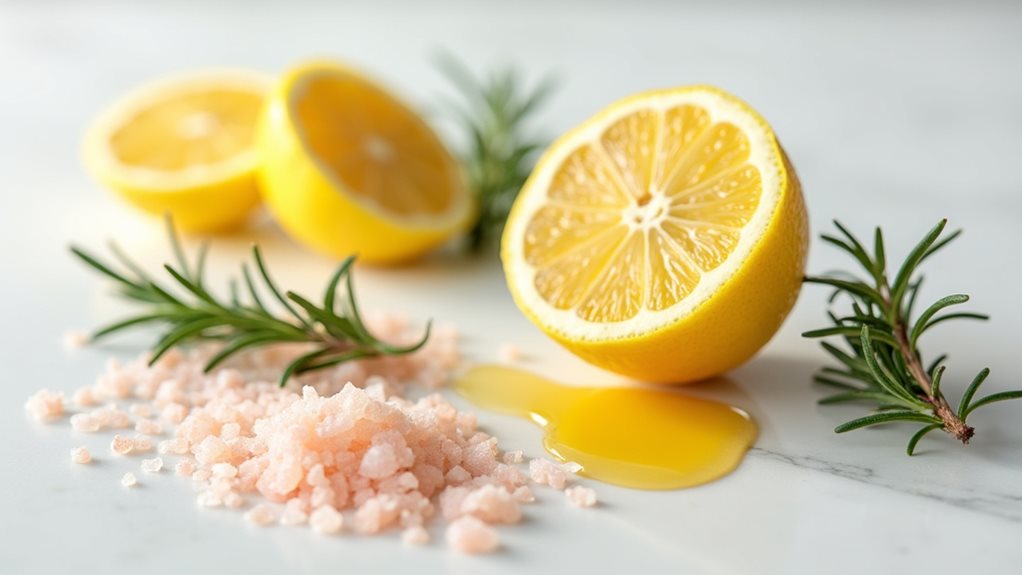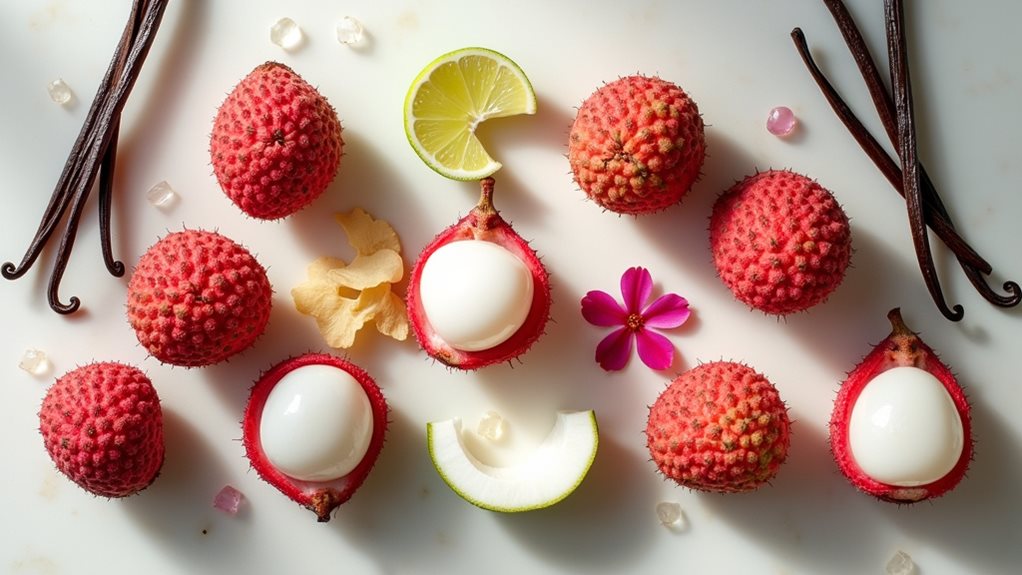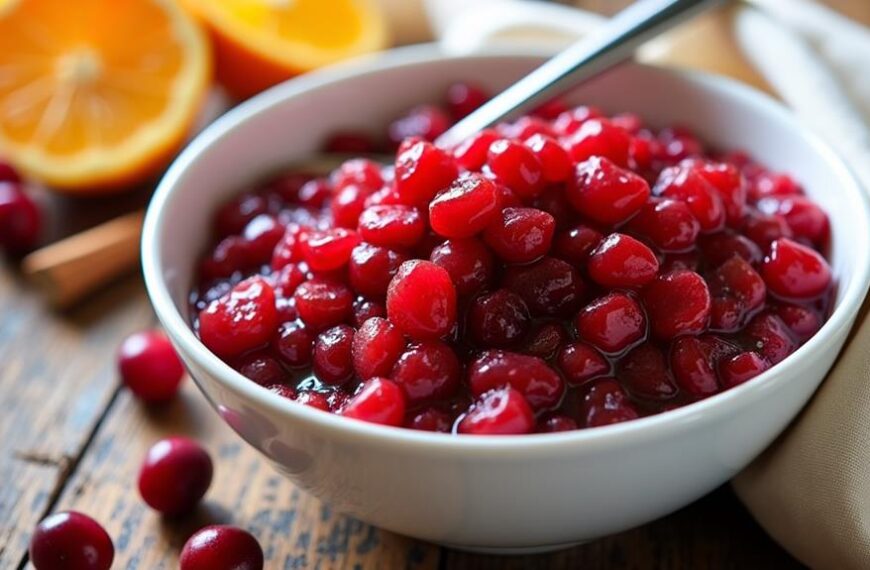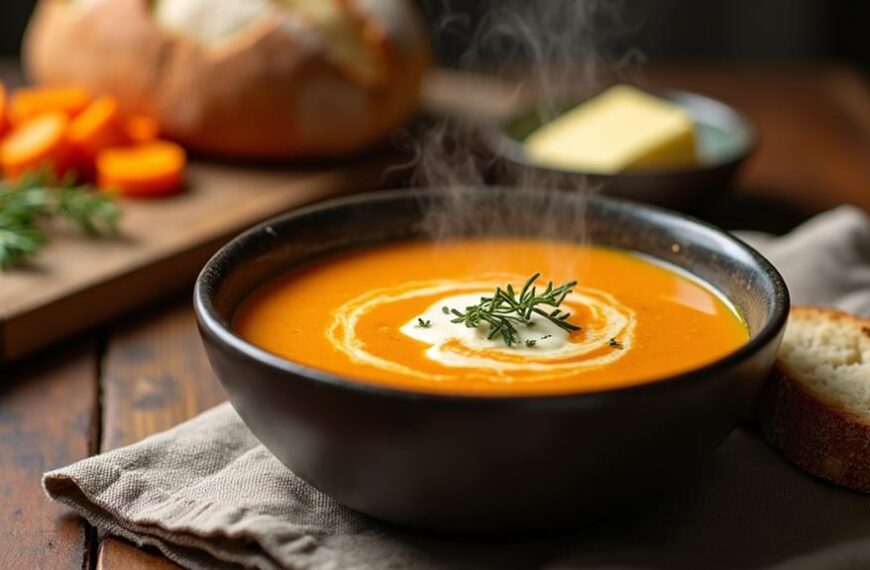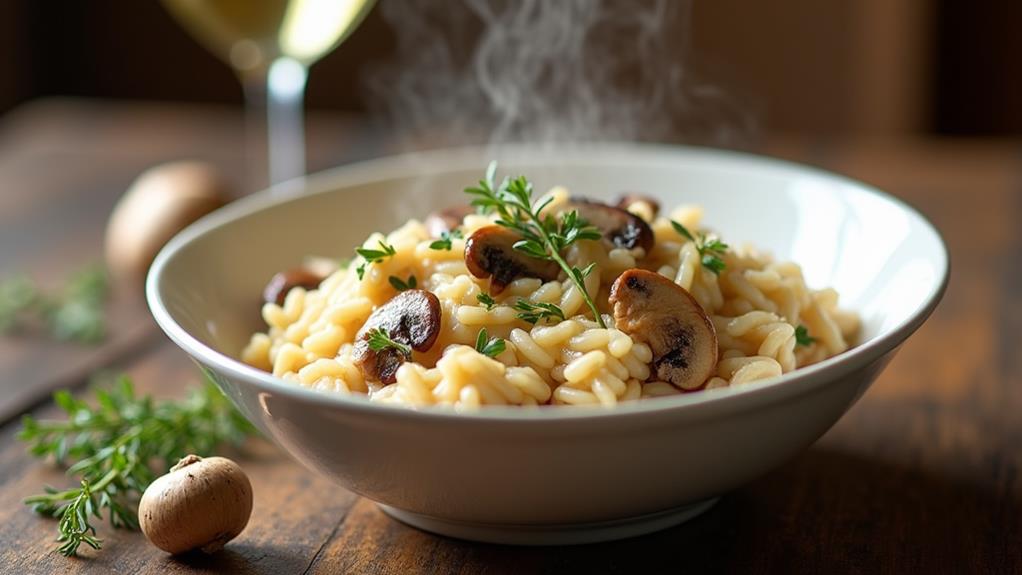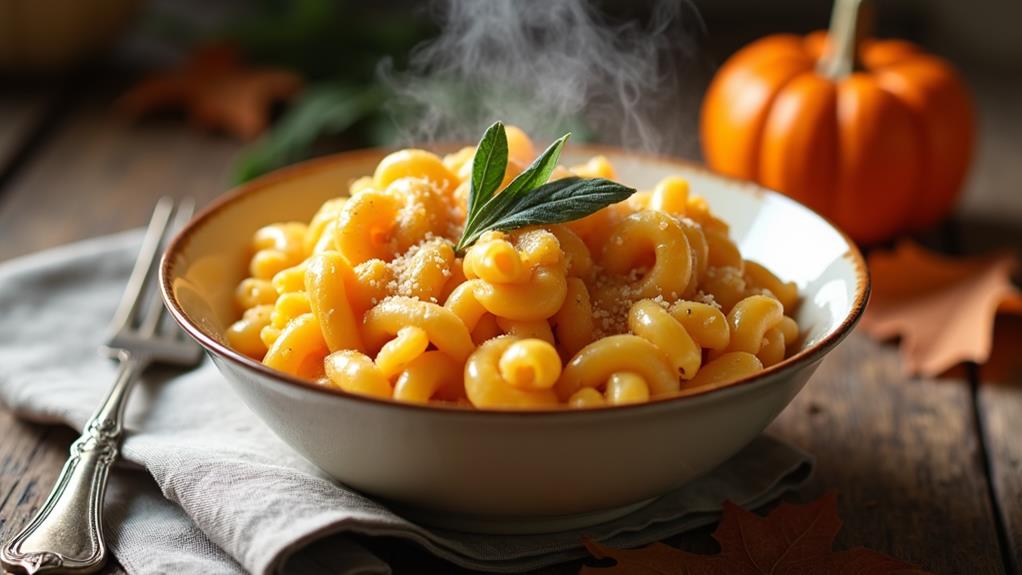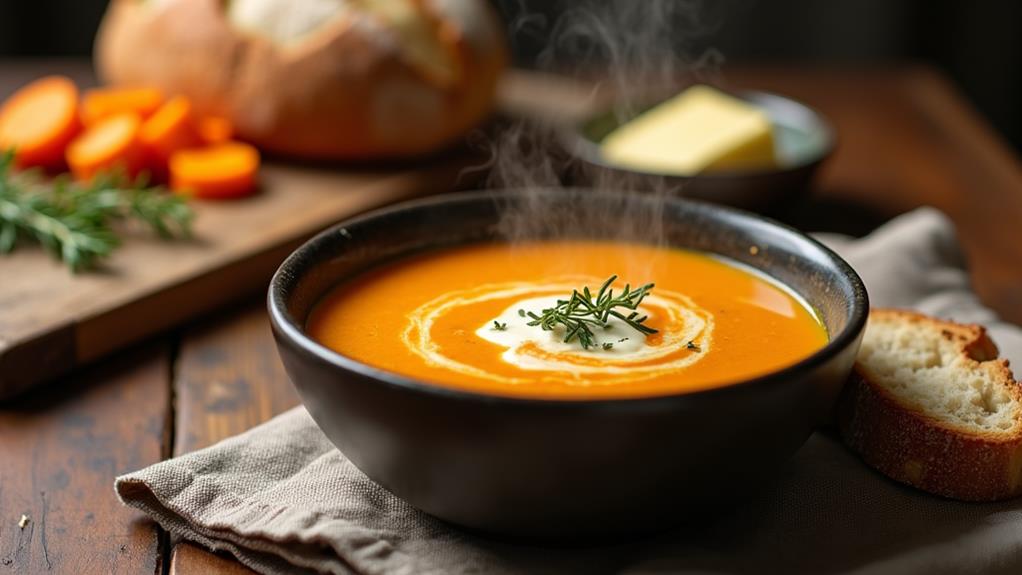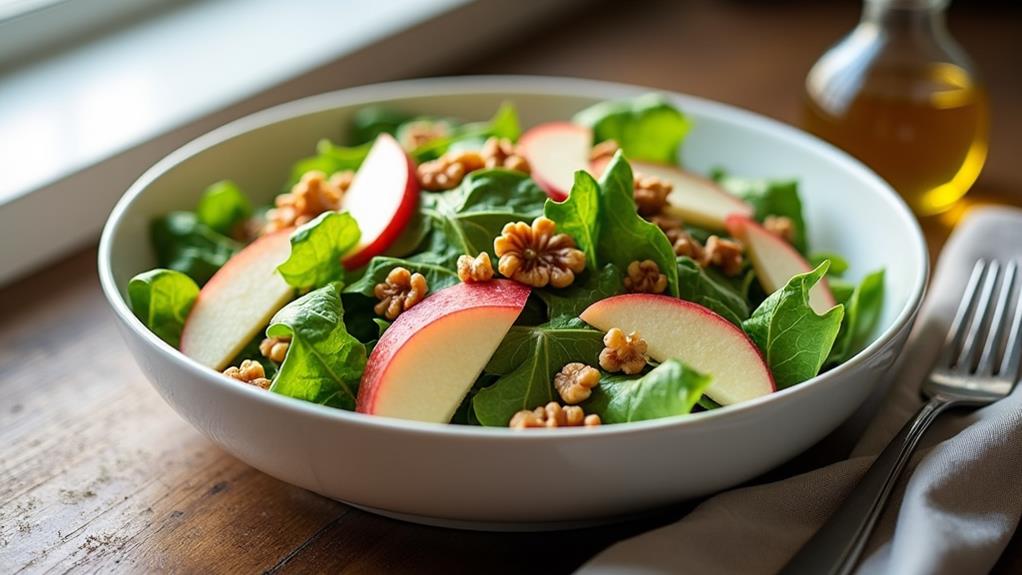Lemon pairs beautifully with herbs like basil, mint, and thyme, while spices such as black pepper, cardamom, and ginger enhance its brightness. You'll find delicious combinations with berries, tropical fruits, and seafood, as lemon naturally tenderizes proteins and balances savory flavors. For texture and depth, try adding nuts like almonds or pistachios, and complement with cheeses such as feta or ricotta. Beyond these basics lies a world of global traditions waiting to transform your culinary creations.
Classic Herb Companions for Lemon
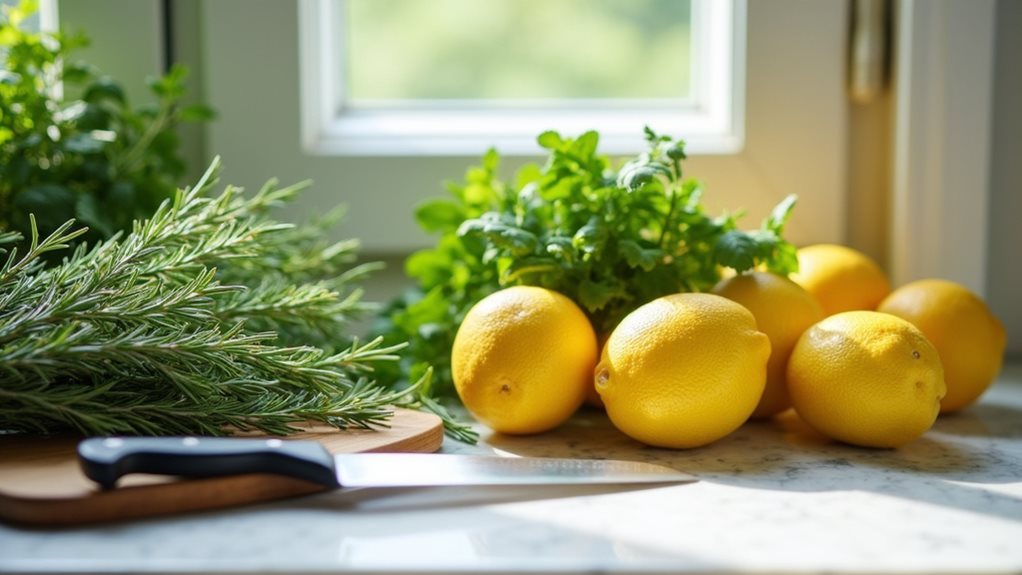
When exploring the vibrant world of culinary combinations, you'll find that certain herbs naturally complement lemon's bright, acidic profile, creating harmonious flavor marriages that enhance both ingredients.
Lemon balm offers both calming properties and culinary herb benefits, particularly in teas and desserts where its gentle citrus notes shine.
The delicate marriage of lemon balm's soothing essence and subtle citrus character transforms ordinary teas and sweets into aromatic revelations.
You'll discover lemon thyme brings drought tolerance to your garden while elevating poultry and potato dishes.
For maximum impact in culinary herb combinations, try lemon verbena in desserts and teas, where its intense aromatic qualities flourish.
Mint adds welcome freshness to lemon-based drinks and summer salads, while basil creates Mediterranean magic when paired with lemon.
Each herb brings unique characteristics that transform ordinary lemon dishes into extraordinary culinary experiences.
Lemongrass provides Asian cuisine depth with its woody stalks imparting citrus flavor to stir-fries and soups before being removed prior to serving.
Growing lemon verbena with dill and cilantro creates a lemon herbs combination that thrives together in similar growing conditions.
Consider using a mortar and pestle to crush fresh herbs with lemon zest, releasing essential oils that intensify flavor profiles in your culinary creations.
Spices That Elevate Lemon's Brightness
While herbs provide a crisp dimension to lemon's profile, the world of spices offers bold and aromatic elements that transform lemon's brightness into something truly extraordinary.
You'll find that strategic spice combinations like black pepper and cardamom can dramatically enhance lemon's natural zest while creating complex flavor profiles.
For innovative culinary experiments, try pairing lemon with unexpected allies like juniper berries for a gin-inspired twist, or sumac to double down on tartness with a Middle Eastern flair.
When balancing lemon's acidity, reach for warming spices like cinnamon, allspice, or garam masala. Black pepper particularly creates a zesty enhancement when combined with lemon zest in homemade seasonings for chicken and seafood dishes. Cinnamon especially creates a delicious combination with lemon and sugar that works wonderfully in both sweet and savory applications.
In beverages, ginger and hibiscus create invigorating dimensions, while cayenne adds surprising heat that amplifies citrus notes.
These pairings don't merely complement lemon—they elevate it to new flavor territories worth exploring.
Fruits That Create Magical Combinations With Lemon
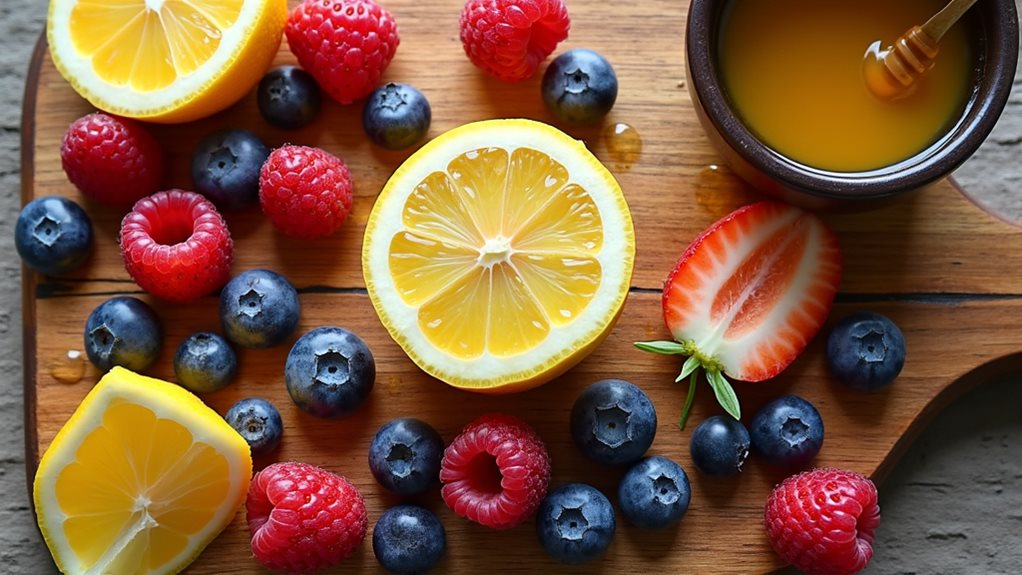
Lemon's bright acidity creates extraordinary flavor dynamics when paired with other fruits, transforming ordinary dishes into memorable culinary experiences.
You'll discover berry blends that balance sweetness with tartness—try blackberries, blueberries, and strawberries for a harmonious contrast that elevates desserts and breakfast dishes alike.
For tropical twists, combine lemon with mango, papaya, or passion fruit to create exotic flavor profiles that transport your palate to distant shores. The search bar feature on the Ultimate Fruit Flavor Pairing Chart helps you quickly find additional compatible fruits for your lemon-based recipes.
Don't overlook classic pairings like apples and bananas, where lemon enhances their natural qualities while preventing browning.
Citrus companions such as orange and grapefruit amplify lemon's zestiness, while melons like honeydew and watermelon provide invigorating counterpoints. For a refreshing summer option, combine lemon with watermelon and crumbled feta for a Mediterranean-inspired salad that balances sweet, salty, and tangy flavors. Lemon's versatile nature comes from its complex flavor profile that includes sourness, bitterness, astringency, and subtle sweetness.
These intentional combinations will expand your culinary repertoire and inspire creative, memorable dishes.
Seafood and Protein Pairings for Zesty Dishes
You'll discover that lemon's bright acidity transforms seafood when used in citrus-steaming techniques, cutting through richness while enhancing the natural flavors of shellfish and white fish.
For poultry, zesty marinades combining lemon juice, herbs, and olive oil penetrate the meat, creating tender, flavorful dishes that avoid heaviness. Try this technique with a whole chicken where chicken cavity stuffing with lemon quarters and thyme sprigs enhances flavor infusion throughout the meat.
These pairings work because lemon's natural compounds both tenderize proteins and balance their savory qualities, making them especially effective in Mediterranean and coastal cuisines. Lemon is particularly excellent with white fish dishes, serving as a classic pairing that adds freshness and helps neutralize any fishy flavors. The Eureka and Meyer varieties of lemon each offer distinctive flavor profiles that can be used to create depth and complexity in seafood preparations.
Citrus-Steamed Seafood Sensations
The marriage of citrus and seafood creates a culinary symphony that transforms ordinary dishes into extraordinary experiences. When you steam seafood with citrus, you're not just cooking—you're infusing delicate proteins with bright, complex flavors while preserving their natural succulence.
Try citrus-infused scallops by placing them on a bed of lemon slices in a steamer basket—the gentle heat extracts the essential oils without overwhelming the scallops' sweetness.
For lemon zest shrimp, create a steaming liquid with water, white wine, and lemon peels, then finish with fresh zest after cooking for a double dose of citrus complexity.
The steaming method works beautifully with all seafood varieties, from delicate white fish to hearty salmon, while the citrus neutralizes any unwanted fishy aromas and enhances the seafood's natural flavors. Consider preparing fish in foil packets with lemon and herbs for a simple yet flavorful dinner option that retains moisture perfectly. For a gourmet accompaniment, pair your citrus seafood with a classic arborio rice risotto enhanced with fresh thyme to complement the zesty notes. For an elevated experience, try our premium wild-caught halibut fillets, which pair exceptionally well with bright citrus notes.
Zesty Poultry Marinades
While citrus elevates seafood with bright, delicate notes, its transformative power extends magnificently to poultry, creating marinades that infuse depth and character into every bite.
Lemon, the versatile cornerstone of zesty marinades, pairs brilliantly with herbs like rosemary, thyme, and oregano to develop complex flavor profiles.
Master marinade techniques by layering ingredients strategically—combine lemon juice with olive oil for moisture, garlic for depth, and a touch of heat from crushed red pepper flakes.
You'll find that marinating chicken for as little as 30 minutes creates noticeable impact, though longer periods yield more pronounced results.
These marinades work equally well for grilled or baked preparations, complementing Mediterranean-inspired sides like Greek salads or roasted vegetables.
For ultimate versatility, try using yogurt or Italian dressing as bases to expand your culinary repertoire.
For ideal flavor absorption and food safety, always use non-reactive containers when marinating chicken to prevent unwanted chemical interactions between acidic ingredients and your cookware.
Cheeses That Balance Lemon's Acidity

Finding the perfect cheese to pair with lemon's bright acidity creates a harmonious balance that can elevate both ingredients to new heights.
Soft varieties like ricotta and mascarpone offer creamy textures that effectively neutralize tartness while enhancing lemon's vibrant notes. For innovative cheese pairings, try combining lemon with chevre or cottage cheese in cold applications where acidity balance is essential.
The velvety embrace of soft cheeses tames lemon's sharpness while amplifying its sunny character in every bite.
Mild cheeses such as mozzarella and Monterey Jack provide subtle backgrounds that let lemon shine without overwhelming your palate.
For more complex flavor profiles, incorporate stronger options like Parmesan or feta—both add salty depth that complements citrus brightness.
You'll find particular success with classic combinations like Greek salads featuring feta or lemon garlic pasta finished with freshly grated Parmesan.
Global Flavor Traditions Using Lemon
Across the world, lemon's bright, acidic profile creates magic when paired with regional ingredients and traditional cooking methods.
You'll find Mediterranean dishes like Greek avgolemono soup balancing rich olive oil with lemon's sharpness, while North African cuisines transform preserved lemons into umami-packed condiments for salmon and vegetables.
Lemon desserts span continents—from Italian Limoncello-infused cakes in Campania to American Shaker lemon pie featuring whole citrus.
When exploring global cuisines, try Turkish lentil soup brightened with lemon juice or Moroccan roasted vegetables enhanced with citrus.
Lemon beverages offer invigorating options too; the Middle East's mint lemonade provides inspiration for your summer entertaining.
For innovative combinations, pair lemon with unexpected partners like dark roasted almonds, sumac, or mace—ingredients that share complementary aromatic compounds and create memorable flavor experiences.
Consider fermenting lemons with other vegetables to create complex flavor profiles where the lacto-fermentation process transforms the citrus notes into something uniquely tangy and aromatic.
Crafting the Perfect Lemon-Based Beverages
When mixing spirits with lemon juice, you'll find that clear spirits like vodka and gin highlight lemon's brightness while darker spirits like whiskey create deeper, more complex flavor profiles.
For an herbal infusion masterclass, try muddling fresh herbs such as basil, rosemary, or thyme in your lemon cocktails before adding the remaining ingredients.
You can further elevate your lemon beverages by incorporating herb-infused simple syrups, which allow the botanical notes to meld seamlessly with the citrus punch that defines these invigorating drinks.
Spirits Meet Citrus
Lemon's bright acidity creates magic when paired with the right spirits, transforming ordinary alcoholic beverages into sophisticated drinking experiences.
When crafting spirit infusions, vodka offers the most neutral canvas, allowing lemon's vibrant profile to shine in classics like the Lemon Drop martini. But don't stop there—whiskey brings caramel notes that beautifully counter lemon's tartness in bourbon sours.
Your cocktail experiments needn't follow convention. While gin traditionally partners with lime, its botanical complexity creates fascinating depth when matched with lemon instead.
Tequila-based lemon margaritas deliver a revitalizing alternative to their lime counterparts, especially when rimmed with salt or sugar. Even rum, particularly lighter varieties, welcomes lemon's crisp character to cut through sweetness.
The key is balance—too much citrus overwhelms, while too little fails to brighten the spirit's character.
Herbal Infusion Masterclass
The botanical marriage of herbs and lemon creates beverages that transcend ordinary refreshment, offering complex flavor profiles that dance on the palate.
You'll discover that herbs like thyme, basil, and lavender each contribute distinctive notes—from savory to floral—that complement lemon's bright acidity.
Master herb infusion techniques by simmering herbs in sugar water to create aromatic syrups, or try the sun tea method for gentle flavor extraction.
When muddling lemon with sugar, you're not just sweetening—you're releasing essential oils that elevate your beverage.
For sophisticated variations, combine multiple herbs or add adaptogens like tulsi for stress-relief benefits.
Transform your creations further by incorporating herbal honey or freezing infusions into ice cubes for sparkling water.
These methods don't just produce delicious drinks—they deliver wellness benefits while showcasing your culinary creativity.
Remember to always select high-quality ingredients for your infusions to ensure vibrant flavors and the most robust aromatic experience.
Nuts and Seeds: Adding Texture to Lemon Creations
Perfectly complementing lemon's bright acidity, nuts and seeds introduce essential textural dimensions that elevate both sweet and savory creations.
The nutty contrasts and creamy textures transform ordinary lemon dishes into memorable culinary experiences. You'll find that almonds provide softness to lemon curd bars, while pistachios contribute their tender, buttery quality to desserts with visual appeal. This textural diversity serves the same purpose as the glossy finish achieved when maple syrup caramelizes on glazed carrots.
- Pair cashews with lemon and rosemary for a sophisticated roasted nut mix that balances savory and tangy notes
- Incorporate sesame seeds into lemon-herb crusts for chicken to add subtle crunch and depth
- Try pecans in lemon vinaigrette salads where their rich crunch offsets the dressing's brightness
- Explore lemon-pistachio combinations in both sweet and savory applications for color contrast and texture variation
Frequently Asked Questions
Can Lemon Extract Substitute Fresh Lemon in Recipes?
Yes, you can substitute lemon extract for fresh lemon in most recipes. It offers concentrated flavor intensity without acidity, but you'll need less—typically 1/2 teaspoon extract replaces 2 tablespoons of juice.
How Does Lemon Interact With Different Cooking Methods?
You'll find lemon enhances different cooking methods uniquely: it brightens slow-cooked dishes, cuts through fried foods' richness, adds caramelization when grilling seafood, and creates delicious browning when roasting vegetables through Maillard reactions.
Does Lemon Pair Well With Chocolate?
Like two dancers in perfect rhythm, lemon and chocolate create magic in your dessert pairing. You'll find dark chocolate works best, balancing lemon's brightness with its richness—a bold, innovative combination worth exploring.
What Causes Lemon to Curdle Milk or Cream?
The milk acidity reaction happens when lemon's low pH neutralizes casein proteins' negative charges. You'll see the curdling process accelerate as acid breaks calcium bonds, causing proteins to clump together into visible curds.
Can Lemon Be Paired With Umami-Rich Ingredients?
You'll find lemon umami combinations surprisingly dynamic. The acidity brightens and balances savory lemon dishes, creating depth when paired with miso, soy sauce, mushrooms, or fermented foods. It's a chef's secret weapon.
Final Thoughts
Whether you're creating zesty marinades, crafting tangy desserts, or mixing revitalizing beverages, lemon's versatility releases countless culinary possibilities. You'll find its bright acidity complements everything from delicate herbs to robust proteins. Like sending a telegram to your taste buds, these pairings amplify lemon's natural charm while creating balanced, sophisticated flavor profiles. Experiment with these combinations in your kitchen, and you'll discover why lemon remains a timeless ingredient cherished by chefs worldwide.

